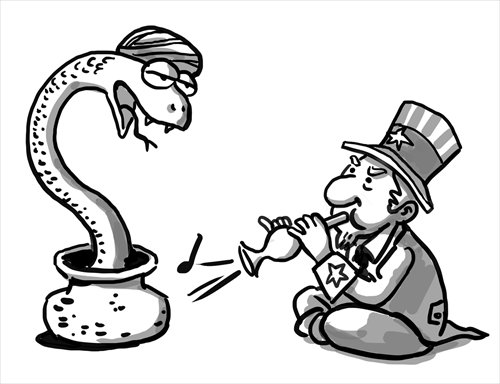HOME >> OP-ED
India wary of US courtship efforts
Source:Global Times Published: 2014-9-25 20:18:01

Illustration: Liu Rui/GT
Indian Prime Minister Narendra Modi will visit Washington to meet with US President Barack Obama next week. His visit comes after his trip to Japan in early September and his recent reception of Chinese President Xi Jinping.
Since Modi took office in May, the US has been trying to mend ties with India that had fallen to the lowest point in years. The US once denied a visa to Modi for his alleged failure to prevent riots in his state when he was chief minister of Gujarat.
Last week, the US nominated the new ambassador to India, which was just ahead of Modi's US visit. The previous ambassador to India, Nancy Powell, resigned in late March amid a controversy over Indian diplomat Devayani Khobragade who was arrested and strip-searched in New York City after being accused of visa fraud.
The US hopes that Modi's visit will offer a chance to mend the partnership. The US also views India as an ideal partner to counterbalance China's growing power, as the US itself has been busy with the Ukrainian crisis, the IS threat and disputes in the South China Sea and the East China Sea.
Meanwhile, although India is not a first-class major power, it helps in stabilizing the situation in South Asia and the Middle East.
Prior to Modi's visit, the US borrowed a helping hand from Japan. In January, Japanese Prime Minister Shinzo Abe was invited as the chief guest at India's Republic Day parade. In early September, Modi visited Japan and achieved some positive results. Japan's desire to contain China and Washington's muddling are both evident.
It is clear that some of the world's most important figures are showing warmth toward India's new prime minister, highlighting the geopolitical rivalry currently reshaping Asia. It also indicates India's particular attractiveness and flexible role.
For instance, the West has already embraced several of India's large private firms, making it easier to attract foreign investment to India and for other Indian companies to build on their experience when moving abroad. Meanwhile, the Indian workforce has strong English-speaking capability and behaves exceedingly in the global service field and high-value industries such as software and telecom.
Another card that India holds is that India boasts of being the largest democracy in the world. It has common values with the US. Therefore, Washington speaks highly of India in this regard. This makes India a natural choice for some Western countries to woo.
At the upcoming Modi-Obama meeting, it is expected that they will talk about cooperation in many issues such as cyber security, defense, nuclear cooperation and climate change.
In terms of cyber security, India is known for its information technologies. During UK Prime Minister David Cameron's visit to India last year, he also signed a cyber security deal with then Indian prime minister Manmohan Singh. Modi will not return empty-handed.
Although cooperation in some fields is foreseeable, it is hardly likely that the two will become firm military allies. A country's foreign policies are determined by its core interests. India is unlikely to abandon its nonalignment policy and seek to become a regional power through military alliances.
India will remain wary of US policies on South Asia, because the US will never allow India to be a hegemonic power in South Asia and the Indian Ocean. In terms of security, the real aim of US cooperation with India is to put India's nuclear proliferation under control.
Meanwhile, if India embraces the US, it may face more challenges from terrorism.
Even if India is concerned about China's rise, it does not necessarily have to give up its nonalignment doctrine. Both China and India are in a period of rapid economic development. The two share many things in common, and benign competition suits the interests of both.
Modi will play the economic card during his term to meet his promises made during his election campaign. In terms of basic infrastructure construction, it needs to work with China. This proves Modi's pragmatic foreign policies, and that's also why India gave a warm welcome to Xi just days ago.
The article was compiled by Global Times reporter Wang Wenwen based on an interview with Wang Dehua, head of the Institute for the Southern and Central Asian Studies, the Shanghai Municipal Center for International Studies. wangwenwen@globaltimes.com.cn
Posted in: Viewpoint